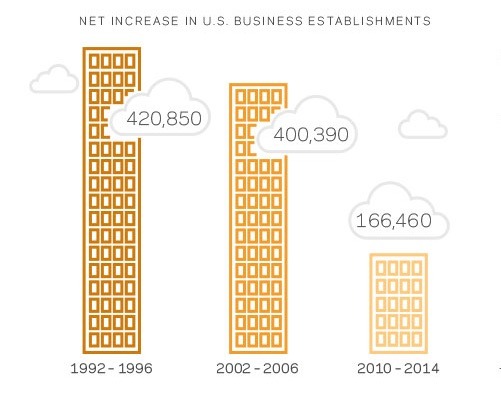
“A missing generation of new enterprises could threaten access to opportunity for millions of Americans,” says the senior director for policy and strategy at the Economic Innovation Group in Washington, John Lettieri. “In the vast majority of communities across the country, the seeds are simply not being planted for an entire generation of new industries and good paying jobs,” he says.
A study by his organization recently examined how new business formation and job creation in the current economic recovery stacks up to past recoveries. EIG’s report, “The New Map of Economic Growth and Recovery,” released this week, details a national collapse in new business creation since the Great Recession. EIG calculated a 165,000 net rise in new establishments, compared to approximately 400,000 in past recoveries during the 1990s and 2000s.
EIG blames the collapse on a steep fall-off in the creation of new startups across wide swathes of the country. Instead, it found a dramatic increase in the geographic concentration of business and job growth. Lettieri says the “startup-less recovery” and growing geographic disparities should “serve as a wake-up call to policymakers.”
EIG’s study, which relied on the U.S. Census Bureau’s County Business Patterns program, is a first look at how recovery from the Great Recession compares to post-recession recoveries in the 1990s and 2000s. According to the report, only 20 counties accounted for half of all new businesses and 73 counties produced half the net increase in jobs in the 2010s, while the economic outlook has been starkly transformed for thousands of American communities. In a reversal from past economic recoveries, the country’s most populous counties are now its fastest growing. From 2010 to 2014, counties with over one million people contained just over 1 in 4 Americans but produced nearly 6 in 10 of its new business establishments.
EIG executive director Steve Glickman says, “Anyone who cares about economic inequality should be tremendously concerned” about the long-term implications of the patterns emerging from the Great Recession, including less variety in employment opportunities, weaker competition, less innovation, and ultimately slower productivity growth.
Download the full report and view additional graphics at the EIG website.
Graphic image: EIG
Follow Adrienne Burke @adajane




